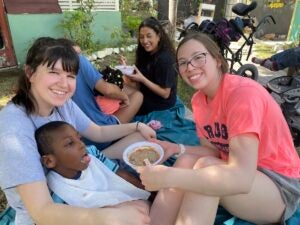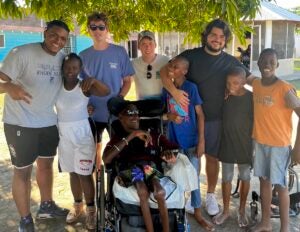Students get hands-on experience, provide training for caregivers, learn about the culture of developing world
A group of University of Rhode Island students from the colleges of Nursing and Pharmacy spent part of their winter break in Jamaica. But they weren’t there to sunbathe on the beach or frolic in the waves. Instead, they spent their time working with some of the most vulnerable populations in Jamaica.
Fourteen students from the Academic Health Collaborative joined College of Nursing Professor Chris McGrane in working with residents affiliated with Mustard Seed, an organization in Jamaica that serves children and adults with severe disabilities who do not have family members to care for them. The students lived among the patients in the residential community, Sophie’s Place, feeding residents who are unable to feed themselves, providing comfort and leading those with some ambulatory ability in light physical therapy.
 “Where we stayed, none of the residents are self-feeders and there are only three caregivers per shift, called ‘aunties,’” McGrane said. “Aunties have to change, feed, and bathe residents and then start the process again. So, when they have volunteers like us, which they haven’t had since pre-COVID, they can spend more time with the children doing other things.”
“Where we stayed, none of the residents are self-feeders and there are only three caregivers per shift, called ‘aunties,’” McGrane said. “Aunties have to change, feed, and bathe residents and then start the process again. So, when they have volunteers like us, which they haven’t had since pre-COVID, they can spend more time with the children doing other things.”
McGrane had been leading the URI contingent to Jamaica every other January since 2013. COVID-19 put a halt to travel, so this was the first URI trip to Sophie’s Place in four years. Students made up for lost time providing direct care, planning workshops for the “aunties” at multiple sites, caring for dozens of children and young adults, and teaching them about medication schedules, self-care, and proper use of medical equipment — much of which the students brought with them to donate.
“We all bring one checked bag with supplies in it. We brought about 30 suitcases, which were donated to leave there with the supplies,” McGrane said. “Over the counter medications, oral syringes, g-tubes for feeding. We bring lots of toys, toiletries, clothing, masks and gloves. This was an extremely generous group. At the end of the trip, most of them came back with just a backpack on their backs. Everything else was donated.”
 Helping those less fortunate was a big part of the trip, according to pharmacy student Caroline Joncas, who said she gained a new perspective on things considered the basics in the United States that are luxuries in the developing world.
Helping those less fortunate was a big part of the trip, according to pharmacy student Caroline Joncas, who said she gained a new perspective on things considered the basics in the United States that are luxuries in the developing world.
“The smallest things we take for granted. For example, they don’t always have towels, so sometimes they have to cut up clothes to make rags,” Joncas said. “They’re just using whatever they can. It made me really think about the small conveniences and luxuries I have, when they have to jump through so many hoops just to make the smallest things doable.”
Joncas, a fifth-year pharmacy student who plans to go into clinical pharmacy after graduation, also gained a new perspective on her career.
“It kind of taught me that working with people with disabilities is not as intimidating as I thought it would be,” she said. “I was always worried, especially with the non-verbal population. You don’t know if you’re hurting them; you don’t know if they’re happy. But I realized that is not always the case. You can realize how they feel; you just have to get to know them. It gave me more confidence working with people with disabilities going forward.”

